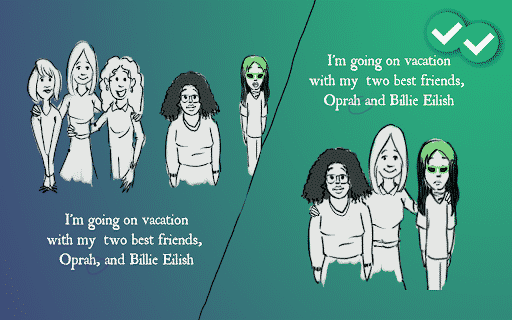Click below to listen to a recording of this passage.
Much like the em dash, the Oxford (or serial) comma is one of the most contested punctuation marks within the grammar world. Every year, you can find articles arguing for and against one of the most basic comma rules in English.
Some people love it. Some people hate it. And many average, everyday writers don’t even know what it is. But does a comma before and, or, or but even matter? And is it important for you to know as an ESL student?
A group of dairy delivery drivers in Maine would argue that it does! They received a $5 million dollar court settlement because a document left out an oxford comma in what we now know as the oxford comma court case.
We’re not saying you’ll get a million dollars because of the information in this article, but who knows? Either way, for our ESL students, we will answer the question: what is the Oxford comma and why is it so important? And we’ll show you how and when to use it.
What is an Oxford Comma?
Click below to listen to a recording of this passage.
Look at this sentence from the introduction:
- But does a comma before and, or, or but even matter?
The comma that comes before the second or in the sentence is an Oxford comma. It is a comma that separates the last item in a list of things.
Other Oxford Comma Examples:
- France, Britain, and Germany were the key countries backing the proposal.
- I’m not sure if I should bring my red, black, or brown shoes on the trip.
- Kelly said we’re having Mexican, Italian, or Chinese food this evening.
It was named after its required usage by the Oxford Style Manual, and that’s important to note because style is the word that serves as the main argument with this punctuation. Its use completely depends on the writer or editor’s chosen style.
Some style guidelines, like the AP (Associated Press), The New York Times, and The Economist oppose its usage. Whereas, other guides like the MLA Style Manual, Chicago Style Guide, and the AMA (American Medical Association) support mandatory usage.
Whether you should use it is up to you, unless an editor or professor says otherwise. However, in the next section we’ll explore why some people argue for and against its use.

Is A Comma Before ‘And’ Necessary?
Click below to listen to a recording of this passage.
Using and not using an Oxford comma can cause some confusion for readers which is why using one is so hotly contested by different grammar style schools. So let’s break down some of the confusion so you can decide for yourself.
We’ll start with an example that doesn’t use the comma:
- We’re going on vacation with my two best friends, LeBron James and Billie Eilish.
Without the comma, we can interpret the sentence as saying that you’re going on vacation with your two best friends, and that your two best friends are Lebron James and Billie Eilish.
Now let’s look at the same sentence with the comma:
- We’re going on vacation with my two best friends, LeBron James, and Billie Eilish.
This version of the sentence shows that you’re going on vacation with your two best friends (who are unnamed in the sentence), the basketball player LeBron James, and the singer Billie Eilish.
Those who are for the Oxford comma would argue that the comma is necessary to help clear any confusion about who is going on vacation.
Those who oppose the comma argue that simply rephrasing an already confusing sentence would solve the issue.
- We’re going on vacation with LeBron James, Billie Eilish and my two best friends.
Those opposed to the comma also argue that it can sometimes create confusion. How would you interpret the next example?
- He would like to dedicate the landmark to his father, John Clark, and Mark Summers.
Some argue that the sentence is confusing because the commas around John Clark could represent an appositive phrase. Meaning John Clark is interpreted as being the father of the person dedicating the landmark.
The arguments for and against the comma’s usage all revolve around ambiguity (open to more than one interpretation).
Conclusion
Click below to listen to a recording of this passage.
The Oxford comma is both loved and hated and embraced and discarded by those in the world of writing. Some say it helps a reader resolve ambiguity in interpreting sentences, while others say it isn’t necessary and can create confusion in certain situations.
For texts written for class or other publications, check with your editor or professor to see what is the preferred style.
In your own writing, it will be up to you to decide which style you want to use. There are no set rules. However, the most important thing to remember as an ESL student is to stick with the style you choose throughout your text.
What are your thoughts on using the Oxford comma? Leave a comment below and let us know!
And if you’re interested in learning other English grammar topics and speaking with other learners like yourself, our starter’s offer includes interactive exercises along with unlimited automatic feedback.
With that, you have access to our Magoosh English Speaking Slack Group where you can get peer feedback from advanced students and discuss grammar topics like the Oxford comma. It’s a great way to take your English learning to the next level!
As always for all things English grammar, pronunciation, and job related, visit the Magoosh Speaking Blog!

